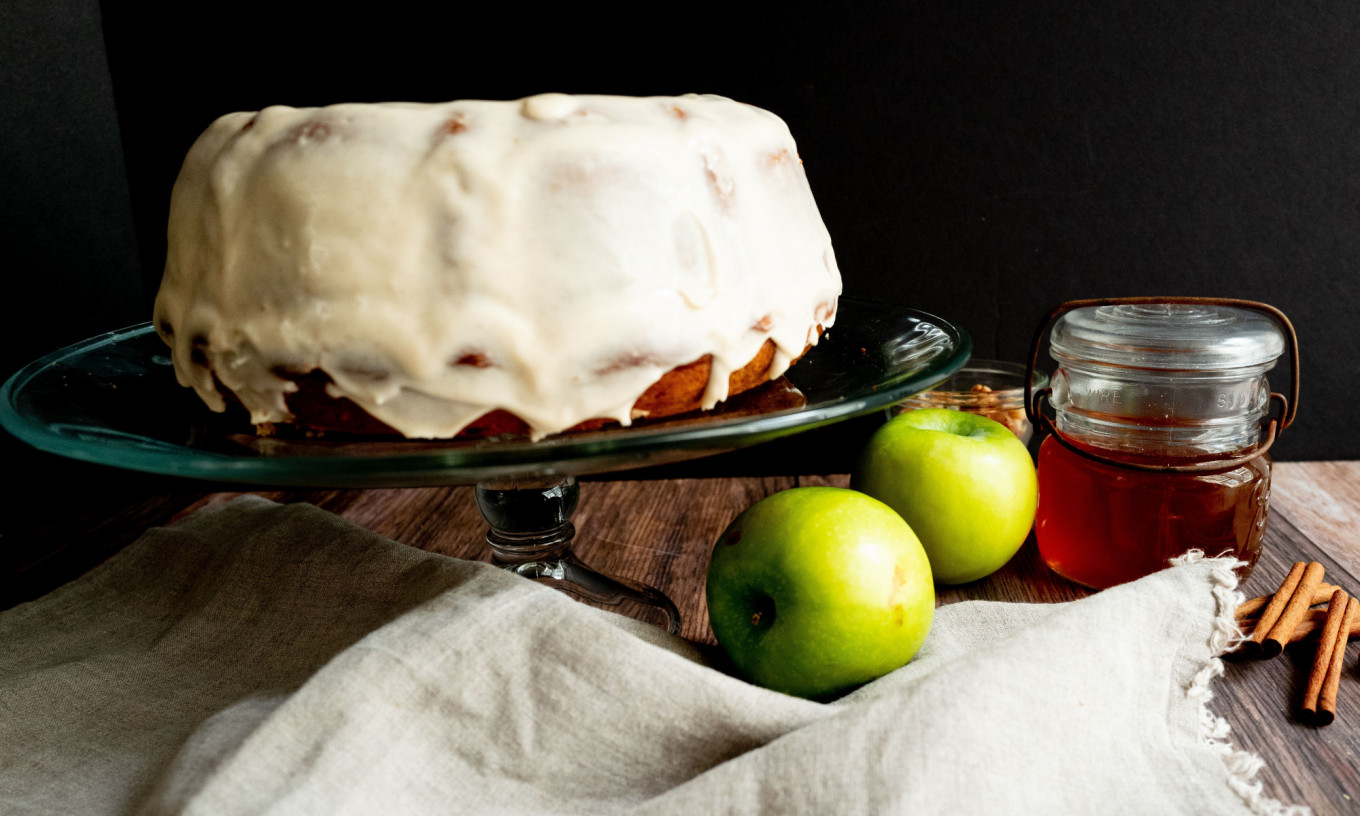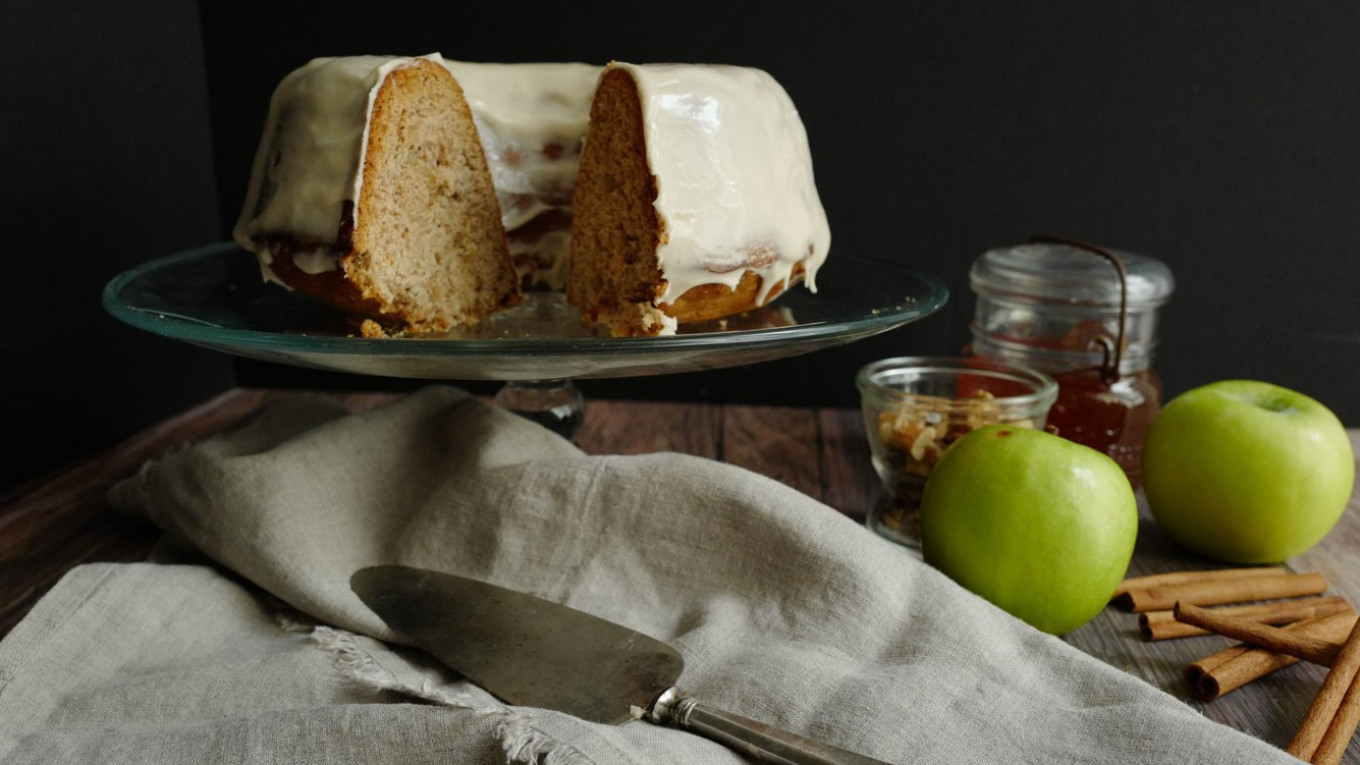Summer’s lease may have all too short an end date, but I for one will be delighted to see the back of it. Autumn’s crisp, cool weather is what I crave right now, and I would welcome a light snowfall with open arms.
I always rejoice to see bushels of red, pink, yellow and green apples nudge the last peaches of the season out of the way. Apples scream “new beginnings!” and for me are synonymous with crisp, unsullied virgin notebooks and new pencils, sharpened to perfection, redolent of wood and slate. I like the Jewish notion of celebrating the new year in autumn far more than I enjoy turning over a new leaf in the frigid, exhausted aftermath of the churn of Christmas.
Apples are front and center this week in one of the more charming liturgical holidays in the Orthodox calendar, officially known as “Transfiguration” but always affectionately known in Russia as “Apple Savior,” or “Apple Spas.” To the unlettered agricultural masses of pre-revolutionary Russia, this was the signal that apples were ripe for picking and marked the beginning of the end of summer — and the end of back-breaking labor in the fields.
The fusing of clearly pagan, agrarian harvest traditions with a Christian holiday was one way the tenth century Christian missionaries achieved success in converting the Slavs of Kievan Rus. “Dvoeverie” or “dual belief” to this day is a powerful undercurrent in Russian culture, as is clear this week in the baskets of apples brought to churches for blessing. Many scholars believe dvoeverie preserved Christian traditions even when they were frowned upon during the Soviet era.
Today, of course, the Russian Orthodox Church is alive and well and Apple Spas is just one of three similar “double faith” holidays heralding the end of summer.
Honey Spas today is celebrated on August 14, but in Russia’s pre-revolutionary Julian calendar fell on August 1. This was the signal for peasants to shift from summer work to autumnal harvest. According to folk traditions, bees left their hives, so honeycomb could be harvested. This date also coincides with the baptism of Grand Prince Vladimir in 988, and so it is often called “wet savior,” and was celebrated in the river lands of Russia by bathing cattle in the rivers, cleaning wells, and washing down the walls of the house.
Nut or Bread Spas coming up on (August 29) marks the end of the first wave of harvests, when a portion of the country was given back to the pagan deities to propitiate a bountiful harvest in the future.

Today, these colorful end-of-summer holidays are celebrated with festivals featuring large pies or cakes made with apples, honey, and nuts. And since I’m all about summer ending as soon as possible, this week I rolled up my sleeves and baked a perfect autumnal cake, featuring all three: apples, honey, and nuts. Because who knows? Perhaps it will be a suitable offering to the pagan gods to have them cool things down a bit?
This cake is a jazzed-up version of a classic 1-2-3-4 cake (1 cup of butter; 2 cups of sugar; 3 cups of flour, and 4 eggs) with honey substituting for half of the sugar. Finely chopped tart apple and meaty walnut give it an interesting texture, while candied ginger livens things up. I’ve gone robust on the spices, as I always do, and you could think about toning down everything but the cinnamon. Though of 3 test recipes, I found the version with the most spices had the more interesting flavor.
I love the look and feel of a Bundt cake, but you could also make this as a simple snack cake in a 9 x 13 pan. But the Bundt allowed me to add one more flavor layer: a cinnamon glaze. This is optional, but I found it elevated the cake from “snack” to “special.”
I’ll be making this one again — throughout the winter. It’s perfect for enjoying over coffee in the morning, tea in the afternoon, and nice enough to serve as a dessert at the end of a dinner — perhaps alongside ice cream or whipped cream.
Roll on, autumn. Roll on.

Honey Apple Spice Cake
Ingredients
- 1 large Granny Smith apple, peeled, cored, and finely chopped (about 1 cup/240 ml)
- ½ cup (125 ml) finely chopped walnuts
- ½ cup (125 ml) finely chopped candied ginger
- 2 Tbsp dried orange peel or 1 Tbsp fresh orange zest
- 1 cup butter (227 grams), softened to room temperature
- ½ cup (125 ml) brown sugar
- ½ cup (125 ml) white granulated sugar
- ¾ cup honey
- 3 cups cake flour
- 2 Tbsp cinnamon
- 1 Tbsp ground ginger
- 2 tsp allspice
- ¾ tsp baking soda
- 1 tsp baking powder
- ½ tsp kosher salt
- 2 tsp vanilla extract
- 4 eggs
- ½ cup coffee
- 2 Tbsp dark rum
Glaze
- 1 ½ cup powdered sugar
- 1 tsp vanilla extract
- 1 Tbsp dark rum
- ¼ cup heavy cream
Instructions
- Preheat the oven to 325ºF (165ºC) and butter and flour a standard Bundt pan or a 9 x 13 rectangular cake pan.
- Sift together the flour, baking soda, baking powder, salt, and spices.
- Cream together the butter, white and brown sugars until smooth. Add the honey, then the eggs one by one.
- Add the dry ingredients in three increments, interspersed by the coffee and rum. The batter will be smooth but fairly liquid.
- Fold in the chopped apple, walnuts, orange peel, and candied ginger, then add the batter to the prepared cake pan.
- Bake for 40-45 minutes until a straw tests clean.
- Cool the cake for 10-15 minutes before removing the cake from the pan. Let it cool on a rack completely before glazing.
- Whisk the glaze ingredients together. Set the cooled cake on a rack set over a baking sheet, then drizzle the glaze over the top of the cake. Sprinkle with more chopped walnuts and/or candied ginger if desired.

A Message from The Moscow Times:
Dear readers,
We are facing unprecedented challenges. Russia's Prosecutor General's Office has designated The Moscow Times as an "undesirable" organization, criminalizing our work and putting our staff at risk of prosecution. This follows our earlier unjust labeling as a "foreign agent."
These actions are direct attempts to silence independent journalism in Russia. The authorities claim our work "discredits the decisions of the Russian leadership." We see things differently: we strive to provide accurate, unbiased reporting on Russia.
We, the journalists of The Moscow Times, refuse to be silenced. But to continue our work, we need your help.
Your support, no matter how small, makes a world of difference. If you can, please support us monthly starting from just $2. It's quick to set up, and every contribution makes a significant impact.
By supporting The Moscow Times, you're defending open, independent journalism in the face of repression. Thank you for standing with us.
Remind me later.







